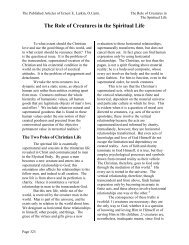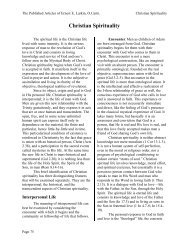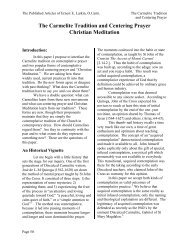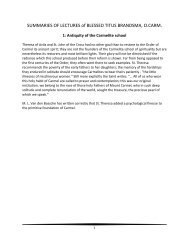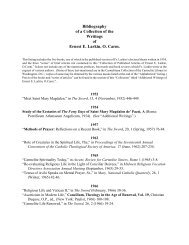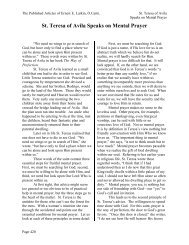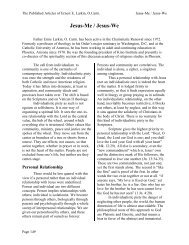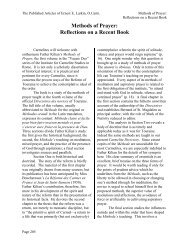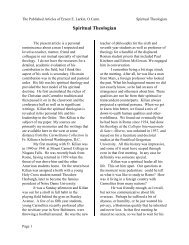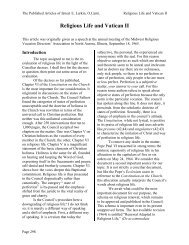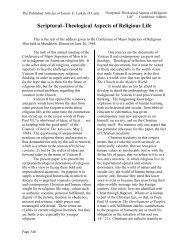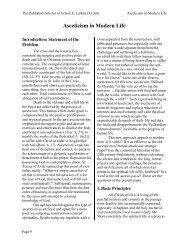Thérèse's Prayer: Trial of Faith, the Absence of God - Carmelnet
Thérèse's Prayer: Trial of Faith, the Absence of God - Carmelnet
Thérèse's Prayer: Trial of Faith, the Absence of God - Carmelnet
You also want an ePaper? Increase the reach of your titles
YUMPU automatically turns print PDFs into web optimized ePapers that Google loves.
The Published Articles <strong>of</strong> Ernest E. Larkin, O.Carm. Therese's <strong>Prayer</strong> (3):<br />
<strong>Trial</strong> <strong>of</strong> <strong>Faith</strong>, <strong>the</strong> <strong>Absence</strong> <strong>of</strong> <strong>God</strong><br />
Page 431<br />
Thérèse’s <strong>Prayer</strong>:<br />
<strong>Trial</strong> <strong>of</strong> <strong>Faith</strong>, <strong>the</strong> <strong>Absence</strong> <strong>of</strong> <strong>God</strong><br />
This is <strong>the</strong> final <strong>of</strong> three articles on <strong>the</strong> <strong>Prayer</strong> <strong>of</strong> Thérèse <strong>of</strong> Lisieux.<br />
As difficult as was <strong>the</strong> dark night <strong>of</strong><br />
<strong>the</strong> second stage, it was a time <strong>of</strong> “living<br />
faith,” when <strong>the</strong> thought <strong>of</strong> heaven made up<br />
all her happiness (Story <strong>of</strong> a Soul – tr. John<br />
Clarke, OCD, Washington, DC: ICS<br />
Publication, 1975, p 109. Henceforth<br />
references to this autobiography <strong>of</strong> Thérèse<br />
will be indicated in brackets with S and page<br />
numbers; this reference, <strong>the</strong>refore, is [S 109]).<br />
On Easter. April 5, 1896, that consolation left<br />
her and her faith itself went into remission.<br />
Heaven seemed like a chimera, an illusion,<br />
and Thérèse entered <strong>the</strong> “thickest darkness” <strong>of</strong><br />
her trial <strong>of</strong> faith.<br />
The veil <strong>of</strong> faith, once almost seethrough,<br />
was now a wall that blocked out <strong>the</strong><br />
supernatural. The very thought <strong>of</strong> heaven was<br />
”a struggle and a torment” [S 211]. She<br />
entered a dark tunnel, walked in a dense fog,<br />
no longer able to sing <strong>of</strong> a faith that resonated<br />
in her being, but only <strong>of</strong> a faith that was an<br />
abstract “will to believe.” “When I sing <strong>of</strong> <strong>the</strong><br />
happiness <strong>of</strong> heaven,” she wrote, “I feel no joy<br />
in this, for I simply sing what I want to<br />
believe.” In her letters at this time she admits<br />
that Jesus does speak on occasion, o<strong>the</strong>rwise<br />
she could not survive. But in Ms C she says<br />
that <strong>the</strong>se “small rays <strong>of</strong> <strong>the</strong> sun” relieved but<br />
<strong>the</strong>n aggravated <strong>the</strong> trial, because “<strong>the</strong><br />
memory <strong>of</strong> that ray made <strong>the</strong> darkness even<br />
more dense” [S 214].<br />
She was experiencing <strong>the</strong> plight <strong>of</strong> <strong>the</strong><br />
a<strong>the</strong>ist, <strong>the</strong> suffering <strong>of</strong> sinners who had<br />
driven <strong>God</strong> out <strong>of</strong> <strong>the</strong>ir lives. The bitterness<br />
was like hell. The previous seven years had<br />
schooled her to <strong>the</strong> presence <strong>of</strong> <strong>God</strong> in<br />
absence. This trial was pure absence, with no<br />
shred <strong>of</strong> assurance <strong>of</strong> <strong>the</strong> invisible presence.<br />
The fa<strong>the</strong>rland <strong>of</strong> heaven no longer beckoned;<br />
it had disappeared. She writes <strong>of</strong> <strong>the</strong> demonic<br />
voices plaguing her: <strong>the</strong> darkness, borrowing<br />
<strong>the</strong> voice <strong>of</strong> sinners, says mockingly to me:<br />
“You are dreaming about <strong>the</strong> light, about a<br />
fa<strong>the</strong>rland embalmed in <strong>the</strong> sweetest<br />
perfumes; you are dreaming about <strong>the</strong> eternal<br />
possession <strong>of</strong> <strong>the</strong> Creator <strong>of</strong> all <strong>the</strong>se marvels;<br />
you are believing that one day you will walk<br />
out <strong>of</strong> this fog which surrounds you.<br />
Advance, advance; rejoice in death which will<br />
give you not what you hope for but a night<br />
still more pr<strong>of</strong>ound, <strong>the</strong> night <strong>of</strong> nothingness”<br />
[S 213].<br />
In October <strong>of</strong> l896, on <strong>the</strong> advice <strong>of</strong><br />
<strong>the</strong> retreat master, Fa<strong>the</strong>r <strong>God</strong>efroid<br />
Madelaine, <strong>the</strong> saint wrote out <strong>the</strong> creed in her<br />
own blood. Suicide confronted her as a way<br />
out. She was taking her place at <strong>the</strong> table <strong>of</strong><br />
sinners, eating <strong>the</strong>ir bitter bread <strong>of</strong> a life<br />
without <strong>God</strong>, and <strong>the</strong> pain was incredible.<br />
Sinners would feel this very pain if <strong>the</strong>y were<br />
in touch with <strong>the</strong>ir real condition, if <strong>the</strong>y did<br />
not medicate <strong>the</strong>mselves by denial, distraction<br />
and substitute gods. She experienced <strong>the</strong>ir<br />
tragic state. She was a countervailing force in<br />
<strong>the</strong>ir nihilistic world. Her suffering, she<br />
believed, was a bulwark against <strong>the</strong>ir hurling<br />
<strong>the</strong>mselves to destruction. She loved people<br />
and she loved <strong>God</strong>, so she was willing to stay<br />
with <strong>the</strong> pain in confidence and in peace,<br />
trusting that <strong>God</strong> was using her in <strong>the</strong> work <strong>of</strong><br />
salvation. She would stay <strong>the</strong>re until such<br />
times as <strong>God</strong> called her home to heaven,<br />
where she would continue her salvific task.<br />
Her call at this point was simply to<br />
love, to love with <strong>God</strong>’s love on behalf <strong>of</strong><br />
sinners and priests. <strong>Faith</strong>’s light had dimmed,<br />
but love’s flame blazed. Her love took on a<br />
superhuman quality, since she was flying
The Published Articles <strong>of</strong> Ernest E. Larkin, O.Carm. Therese's <strong>Prayer</strong> (3):<br />
<strong>Trial</strong> <strong>of</strong> <strong>Faith</strong>, <strong>the</strong> <strong>Absence</strong> <strong>of</strong> <strong>God</strong><br />
blindly, faithful to <strong>the</strong> laws <strong>of</strong> <strong>the</strong> supernatural<br />
world she could nei<strong>the</strong>r see nor even imagine.<br />
All <strong>the</strong> while she kept her peace and<br />
equanimity. She was a sacrificial victim,<br />
preferring vinegar to sugar, savoring<br />
humiliation over praise, which she called<br />
insipid. Why <strong>the</strong>se choices? Because<br />
sufferings proved love and <strong>the</strong>refore were<br />
effective instruments in <strong>the</strong> divine plan. What<br />
Jesus wanted, Thérèse wanted, and what was<br />
happening was what Jesus wanted. So<br />
Thérèse accepted her call. Part <strong>of</strong> <strong>the</strong> mix was<br />
her own nothingness (in which she gloried);<br />
part was <strong>the</strong> merciful love <strong>of</strong> <strong>God</strong> that filled<br />
<strong>the</strong> vacuum <strong>of</strong> her inner self; and <strong>the</strong> catalyst<br />
that brought both <strong>the</strong>se things toge<strong>the</strong>r was her<br />
total confidence and trust in her <strong>God</strong>.<br />
It is no surprise to students <strong>of</strong><br />
Thérèse’s “little way” that her most pr<strong>of</strong>ound<br />
reflections on fraternal charity come from this<br />
period. They form <strong>the</strong> last two chapters <strong>of</strong> her<br />
autobiography and were from <strong>the</strong> last months<br />
<strong>of</strong> her life. Fraternal charity was an integral<br />
part <strong>of</strong> her love <strong>of</strong> <strong>God</strong>; it was “to love as<br />
Jesus loved,” a phrase which opened up to <strong>the</strong><br />
deep mystery <strong>of</strong> <strong>the</strong> gospel teaching, she says,<br />
for <strong>the</strong> first time. If her love <strong>of</strong> <strong>God</strong> was<br />
thriving in inner pain and darkness, she was<br />
also being called to keen attention and<br />
exquisite sensitivity in <strong>the</strong> area <strong>of</strong> loving her<br />
sisters and people. A down-to-earth, human<br />
love that noticed everything, omitted nothing<br />
and rose above every personal repugnance<br />
was <strong>the</strong> counterpart <strong>of</strong> her selfless love <strong>of</strong> <strong>God</strong><br />
at prayer. The watchword was to “appear<br />
happy and to be so” in community no matter<br />
what <strong>the</strong> aggravation. The case <strong>of</strong> poor Sister<br />
St Pierre, who will be remembered in history<br />
for her teeth clicking, is one <strong>of</strong> <strong>the</strong> many<br />
examples <strong>of</strong> charity’s demands. The noise<br />
annoyed Thérèse so much that she would<br />
break out in sweat. But she kept control, even<br />
<strong>of</strong>fering a little humor to lighten <strong>the</strong> scene:<br />
Thérèse imagined <strong>the</strong> noise as a concert, and<br />
she <strong>of</strong>fered <strong>the</strong> concert as a prayer to <strong>God</strong> “in<br />
peace and joy at least in <strong>the</strong> interior <strong>of</strong> her<br />
Page 432<br />
soul.” She notes facetiously that her prayer<br />
was not <strong>the</strong> prayer <strong>of</strong> quiet [S 249-250].<br />
Thérèse would not be canonized for this one<br />
incident. But when it is multiplied a thousand<br />
times, it becomes a heroic way <strong>of</strong> life.<br />
The struggle was a purification. The<br />
rarefied air she was breathing in <strong>the</strong> trial was<br />
removing every “natural” satisfaction she<br />
might have had, even <strong>the</strong> desire to suffer. The<br />
love <strong>of</strong> <strong>God</strong> was <strong>the</strong> single and exclusive<br />
motivation <strong>of</strong> her daily life now. There is<br />
absolutely nothing holding herself to earth<br />
now. She notes: “I no longer have any great<br />
desires except that <strong>of</strong> loving to <strong>the</strong> point <strong>of</strong><br />
dying <strong>of</strong> love” [S 214]. This observation is<br />
dated June 9, l897, <strong>the</strong> second anniversary <strong>of</strong><br />
her oblation.<br />
In view <strong>of</strong> her raging tuberculosis and<br />
<strong>the</strong> loss <strong>of</strong> any felt sense for <strong>the</strong> world <strong>of</strong> faith,<br />
how did she escape being disoriented and<br />
immobilized in depression? The answer is<br />
heroic love. Love was her lifeline. In prayer<br />
this love expressed itself in immovable faith<br />
and trust. Love kept her sane, down to earth<br />
in her human contacts and waiting on <strong>God</strong> in<br />
prayer.<br />
How are we to interpret this trial <strong>of</strong><br />
faith? Is it only an intensification <strong>of</strong> <strong>the</strong><br />
classic dark night <strong>of</strong> <strong>the</strong> spirit, whose thrust is<br />
personal purification? Or is it more? It seems<br />
clear to me that it is redemptive suffering for<br />
sinners, a personal call to Thérèse to “fill up in<br />
her own body what was lacking in <strong>the</strong><br />
sufferings <strong>of</strong> Christ” [Col 1:24]. She herself<br />
saw <strong>the</strong> suffering in this light. She clearly<br />
distinguishes <strong>the</strong> trial from <strong>the</strong> previous years.<br />
Of course <strong>the</strong> trial contributed to a<br />
greater purity <strong>of</strong> heart in Thérèse. But that<br />
was not its raison d’etre. It was, ra<strong>the</strong>r, part<br />
<strong>of</strong> her apostolic vocation to pray for sinners<br />
and for priests. The trial <strong>of</strong> faith was similar,<br />
but not necessarily <strong>the</strong> same, as <strong>the</strong> latter half<br />
<strong>of</strong> <strong>the</strong> life <strong>of</strong> St Paul <strong>of</strong> <strong>the</strong> Cross, <strong>the</strong> founder<br />
<strong>of</strong> <strong>the</strong> Passionists. Biographers and <strong>the</strong> famous<br />
Reginald Garrigou-Lagrange interpreted <strong>the</strong><br />
last forty-five years <strong>of</strong> St Paul’s life as
The Published Articles <strong>of</strong> Ernest E. Larkin, O.Carm. Therese's <strong>Prayer</strong> (3):<br />
<strong>Trial</strong> <strong>of</strong> <strong>Faith</strong>, <strong>the</strong> <strong>Absence</strong> <strong>of</strong> <strong>God</strong><br />
mystical reparation (Reginal Garrigou-<br />
Lagrange, O.P., The Three Ages <strong>of</strong> <strong>the</strong> Interior<br />
Life – tr. Sr Timo<strong>the</strong>a Doyle, OP, St. Louis:<br />
Herder, l948, II, 508-509). Paul <strong>of</strong> <strong>the</strong> Cross<br />
had reached <strong>the</strong> transforming union by age<br />
thirty-one and <strong>the</strong> rest <strong>of</strong> his life was filled<br />
with incredible interior and exterior suffering.<br />
The only reasonable explanation seemed to be<br />
vicarious suffering in reparation for sin.<br />
Thérèse’s trial was like that, but her suffering<br />
was not for <strong>the</strong> satisfaction <strong>of</strong> divine justice,<br />
but <strong>the</strong> salvation <strong>of</strong> sinners. Her perspective<br />
was not divine justice, or even reparation for<br />
sin, both <strong>of</strong> which were popular <strong>the</strong>mes in <strong>the</strong><br />
spirituality <strong>of</strong> <strong>the</strong> times. Her view on <strong>God</strong><br />
was merciful love, love like that <strong>of</strong> <strong>the</strong> great<br />
mystics <strong>of</strong> love, Teresa <strong>of</strong> Avila and John <strong>of</strong><br />
<strong>the</strong> Cross. Thérèse saw herself collaborating<br />
in <strong>the</strong> salvific mission <strong>of</strong> Christ by her<br />
configuration to his passion; one day in<br />
heaven she will continue that mission, no<br />
longer by suffering, but by showering roses as<br />
part <strong>of</strong> her sharing in <strong>the</strong> victory <strong>of</strong> Christ.<br />
Jurgen Moltmann places this<br />
interpretation in historical perspective: While<br />
medieval and baroque mysticism had as <strong>the</strong>ir<br />
goal <strong>the</strong> purification <strong>of</strong> <strong>the</strong> soul, <strong>the</strong> thought <strong>of</strong><br />
sharing in <strong>the</strong> passion <strong>of</strong> Christ has since John<br />
<strong>of</strong> <strong>the</strong> Cross won more room for itself. With<br />
Teresa <strong>of</strong> Lisieux what comes to <strong>the</strong> fore is a<br />
compassio Christi which is mystical and also<br />
involves physical suffering. Her experience <strong>of</strong><br />
death in <strong>the</strong> absence <strong>of</strong> <strong>God</strong> combines Christmysticism,<br />
martyrdom and <strong>the</strong> world <strong>of</strong> every<br />
day. (“Theology <strong>of</strong> Mystical Experience”, in<br />
Page 433<br />
Scottish Journal <strong>of</strong> Theology, 32, 1980, p<br />
515).<br />
Conclusion<br />
<strong>Prayer</strong> as love growing in darkness is<br />
an apt description <strong>of</strong> Thérèse’s prayer. She<br />
entered into progressive darkness as she<br />
moved through life and her love grew apace<br />
with her interior suffering. The darkness<br />
created empty space and utter freedom from<br />
competing influences for <strong>the</strong> full infusion <strong>of</strong><br />
<strong>God</strong>’s love. In <strong>the</strong> beginning <strong>the</strong> darkness was<br />
exterior to her prayer, coming mostly from her<br />
struggles with <strong>the</strong> vicissitudes <strong>of</strong> life and her<br />
own immaturity. In this period her prayer<br />
<strong>of</strong>fered her surcease and strength to carry on<br />
<strong>the</strong> struggle. The darkness in <strong>the</strong> convent<br />
years was interior to <strong>the</strong> prayer. It originated<br />
for <strong>the</strong> most part in <strong>the</strong> purifying influence <strong>of</strong><br />
<strong>the</strong> <strong>the</strong>ological virtues, hollowing out her<br />
interior and filling her with <strong>the</strong> divine life.<br />
This darkness brought her to <strong>the</strong> highest<br />
sanctity. But <strong>the</strong> darkness was to take on one<br />
final quality that constituted a special<br />
vocation. She was called to walk in <strong>the</strong><br />
darkness <strong>of</strong> <strong>the</strong> absence <strong>of</strong> <strong>God</strong> for <strong>the</strong><br />
salvation <strong>of</strong> her bro<strong>the</strong>rs and sisters. She<br />
herself had said that <strong>the</strong> Holy Face, which was<br />
part <strong>of</strong> her name, was <strong>the</strong> heart <strong>of</strong> her<br />
spirituality (“Descouvemont”, op. cit., 312).<br />
Her whole life was in <strong>the</strong> service <strong>of</strong> <strong>the</strong><br />
Church and especially sinners and priests.<br />
The last year-and-a-half <strong>of</strong> her life was <strong>the</strong><br />
sacrament <strong>of</strong> that gift <strong>of</strong> <strong>God</strong> to <strong>the</strong> Church.<br />
May <strong>God</strong> be glorified in this greatest saint <strong>of</strong><br />
modern times.



